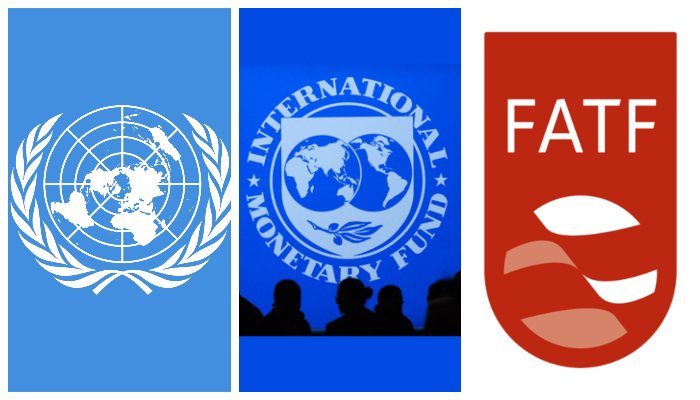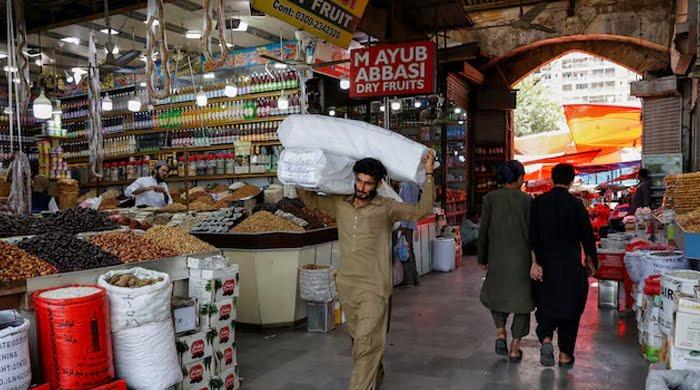Veritable arms of imperialism
The world is caught up in a monstrous flux and it appears difficult to come out of it unscathed
October 22, 2021

The world is caught up in a monstrous flux and it appears difficult to come out of it unscathed. There are powerful countries that are trying to smother the natural development paradigm of those they construe as their adversaries. In the process, the equilibrium achieved through concerted efforts spread over decades is gravely endangered.
On the one hand, the traditional imperialist forces are engaged in further perpetuating their stranglehold by using all instruments within their control and, on the other hand, they bludgeon the weaker countries which try to assert their sovereignty.
Consequently, there is a widening gulf between the imperialist block which has shaped the world over decades and has become used to having its way, and the developing world which is engaged in earnest endeavours to realise its inherent potential. These fledgling efforts are being aggressively jeopardised by the imperialist world through the use of the veritable arms of their power, most notably the United Nations, human rights organisations, FATF, World Bank, IMF, et al.
These powers are quite happy with the conduct of numerous brutal dynastic fiefdoms in the world and are eager to do business with them, but asserting the independence of their clutches by others is anathema to them. Every available mechanism is adopted to block their progress.
While there are efforts to exert unwarranted pressure externally through the use of these veritable arms, internal divisions are also carved to achieve their vile objectives.
Moral and intellectual bankruptcy combined with desperation to save illicit loot by some political leaders are key vulnerabilities which are exploited to push countries back to the days of abject subservience. Pakistan is a classic example.
Since the induction of the incumbent government, stringent efforts have been made to promote its inherent economic and strategic interests in its dealings with the rest of the world. This is viewed as a travesty by the imperialist forces which have been accustomed to manipulating such countries to suit their varied whims and fancies.
No scruples are spared in this effort. As an example, a few days ago, the US charge d’affaires called separately on certified forger and convict Maryam Nawaz Sharif as well as Shahbaz Sharif who is an alleged criminal on multiple counts. She also called on Yousaf Raza Gilani, a person who was dismissed as the country’s prime minister by the supreme judiciary for defying the law in refusing to send a letter to the Swiss authorities regarding reopening of mega corruption cases against Asif Ali Zardari.
Interestingly, the effort came about at a time when rumours of a rift between the political and military arms of the country were ripe, and the opposition was smarting under the dead weight of its internal divisions. One wonders how such activities by foreign diplomats would be viewed in her own country.
The other underlying factor is the manner in which the media is being influenced by the very same interests in a bid to cultivate subversion. The venomous attacks which are being ceaselessly orchestrated against the government by some designated groups and individuals are indicative of the fact that they have been effectively compromised.
The inherent hypocrisy is paramount. There is no count of morality or mention of any rule of law in pursuing their objectives. There is no sensitivity to the right of other countries to design their policies to suit their interests within and around. There is this consuming infatuation not only to perpetuate a decrepit world order which has generated inequality and inequity, but also to use all instruments to stop the errant countries from forging any change. This dubious yardstick is stretched to attract friends as also to handle others who fall out of line.
In our part of the world, the overarching objective that is defining the rules of engagement is the ‘contain China’ policy. The unipolar power base concept has come under increasing threat from an emerging China which the developed world perceives as untenable for perpetuating their traditional hegemony.
What follows is a simple stratagem: those countries which agree with their policy are friends and those with a different viewpoint are not. Pakistan happens to fall into the latter group. With a close, tried and tested economic and strategic partnership with China stretching to over seven decades, it would be suicidal to expect it to change course just to suit the whims of a country with which, at best, it has only had a transactional relationship, often ending up in imposition of stifling sanctions.
While India has been a long-standing partner of the West in their effort to stop China from assuming a leadership role in the world, Australia has also been sucked into building a venomous conglomerate to stoke tension, even initiate hostile acts. With the passage of time, Pakistan is being increasingly pressured to change track and accept India as the regional bully in pursuit of the ‘contain China’ objective.
Since that is not even a possibility worth consideration, it is being subjected to intense external and internal pressures. This is not limited only to the use of international institutions; efforts are also being made to incite internal divisions which have intensified further in the wake of the US withdrawal from Afghanistan.
This is a mammoth challenge that Prime Minister Khan faces in the context of realigning Pakistan’s policies in consonance with its national interests. Ever since he initiated the corrective course, he has been a victim of unsubstantiated criticism from multiple directions: internally by manipulating the corrupt and politically irrelevant forces to be inducted into the imperialist hall of shame and, externally, by exploiting the hold of international donor and human rights organisations to generate grievous misperceptions.
He has neither wilted under the pressure, nor is there a likelihood of this in the future. What follows automatically is that the country will have to weather some very challenging times in days to come.
The permanent solution for Pakistan is to extricate itself from the stranglehold of these inimical pressures which come into play whenever a difficult situation arises. That not being possible in the immediate future, the urgent need is to manage its affairs in a way that its dependence on support from outside is gradually reduced.
Although Pakistan has been one of the best performers in tackling the Covid 19 scourge, the economic cost has been enormous. The government has unfurled a number of initiatives to provide targeted subsidies to the most affected communities, but we all have to endure a time of trial.
The least we can do is to stop politicising the miseries of the suffering people for petty political gains as that would effectively consign such manipulators to the dungeons of moral and intellectual slavery.
The writer is the special assistant to the PM on information, a political and security strategist, and the founder of the Regional Peace Institute. Twitter: @RaoofHasan
Originally published in The News











